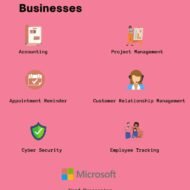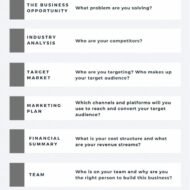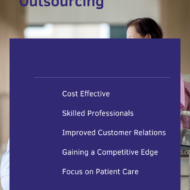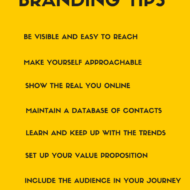Currently Browsing: Entrepreneurship
Posted by Managementguru in Accounting, Business Management, Productivity, Project Management, Technology
on Jun 17th, 2021 | 0 comments

Software is essential in the daily running of a business. However, when you’re first starting out, it can be hard to know exactly what software to use. This guide will take a look at some of the essential types of software for businesses. Accounting Software Accounting used to be one of the most labor-intensive processes in the running of a small business. It could take up hours of valuable time every week – time that could be spent driving sales and developing new product ideas. Now though, accounting software makes the job considerably easier. It has become so much easier, in fact, that many small businesses have been able to keep accounting in-house, rather than outsourcing it. Project Management Software Project management software is one of the most useful tools that a business can employ. Tools like Asana and Trello allow businesses to keep all of their separate projects in one place and allow employees to keep track. This is a great way to stop projects from falling by the wayside and getting missed entirely. IT management services can help with the proper implementation of project management software, which will increase the efficiency of a business. Appointment Reminder Software There are few things less professional than missing an appointment. Whether you are going to meet a prospective client or pitch to investors, it’s essential to arrive on time. That’s where appointment reminder software comes in. You can align every employee’s calendar into one central calendar and automatically send out reminders. This will help your business run in a professional and timely manner. Customer Relationship Management Software Customer relationship management (CRM) software is used by businesses around the globe. It acts as a central location for all customer information, inquiries, and more. This means that sales reps can keep track of inquiries and orders in an efficient and productive way. It also allows marketing teams to access customer data and use it to make informed decisions. Cybersecurity Software Cybersecurity is one of the most pressing issues of the modern business world. In addition to physical security threats, business owners now have to consider their cybersecurity. That’s why it’s absolutely essential for them to have the latest cybersecurity software. This stops hackers from accessing customer information, bank details, and more. However, even the most advanced cybersecurity software can leave businesses open to attack. Word processing Although word processing software has been around for over 20 years, it’s still one of the most common types of software used by businesses. In fact, most businesses still use it on a daily basis. Microsoft Word has always been the most popular word processing software. However, it is now being challenged by online versions like Google Docs. Employee tracking software As an employer, it has always been difficult to keep track of all of your employees. However, now it has been made easier with time-tracking software. You can analyze their time spent on the computer, how many clicks per minute, and what websites were visited. This encourages employees to stay on task. However, it can also create an uncomfortable work...

Posted by Managementguru in Business Management, Entrepreneurship, How To, Marketing, Project Management
on May 20th, 2021 | 0 comments

Running a business is hard work, but the rewards you get can fiscally make it all worthwhile. A business’s success is often down to the owners of the business and their abilities. For a business to truly be a success you, as the owner, need to take responsibility and you need to be confident of the direction your business is going in. A good business owner works on improving themselves alongside improving their business. This dedication and effort mixed will ensure your business is as successful as it can be. Identify And Target Your Key Audiences To make money within your business you must know who your key audiences are. What are they buying, at what cost and from who? Spending time doing your research beforehand will ensure that you can reach your audiences quickly and easily. If you do not identify and target your audiences then you will see that your business will lack focus and direction which is not good for any fledgling business. Make Your Premises Accessible Even if your business premises are only open some of the time to the public it still needs to be readily accessible. From good on-site parking to wheelchair access such as autoslide doors – an accessible, friendly and welcoming site is one that customers will want to visit. If you do not make your site or premises accessible to as many people as possible then you risk losing customers within your key audience and you risk isolating people, which will not do anything for your business’s reputation. Be Competitive And Be Fair Fair prices, open and honest communication all go hand in hand with good customer care, and excellent customer service. If you are not nice and not fair to your customers, then they will take their business and money to your competitors. Of course, on the flipside you must ensure that you stay competitive as you must be able to offer the same (if not better) prices and product ranges than your competitors, simply to ensure you reach and maintain your key audiences. Focus On Your Profit Margin And On Your Bottom Line If your business does not turn a profit, then it will never truly be a success. A profitable business that focuses on the bottom line as well as on their customers and key audience is a business that will be around for many years to come. If you want true success within business then you must be in it for the long haul, and you must be prepared to be versatile and readily adaptable. Keep Things As Fresh As Possible Stagnant and stale businesses will quickly fall behind. If you do not constantly work on improving what you offer and to whom, then you will notice that you will lose new and existing customers alike. To keep things fresh within your business it is important that you regularly monitor what you are doing and what you are offering. If you do not take time out to monitor your businesses activities, then how will you know what and when to push forward, and what to leave...

Posted by Managementguru in Business Management, Entrepreneurship, How To, Real Estate Investment
on May 11th, 2021 | 0 comments

Real estate investment can be a fantastic and highly rewarding way to make money either as a side hustle or as your main income. This could include buying properties and renting them out, fixing and flipping properties for profit, developing or even building new commercial or residential properties. There is always demand for real estate, which is why it is such a popular area for entrepreneurial-minded individuals to invest, but there are also challenges and issues that can make it hard to succeed. Therefore, it is helpful to outline a few essential real estate investment tips that will hopefully allow you to succeed with your investment(s). 1. Diversify You always hear people talk about the importance of diversification when it comes to any kind of investment, and it is certainly smart in real estate. You are limiting your potential and creating risk by only investing in one area, which is why the most successful real estate investors are the ones that have properties in different markets and even different types of properties – this reduces risk and enhances your profitability potential. 2. Know the Area Leading on from this, you need to become an expert on each area before making an investment. The property is only one part of the investment as the neighborhood, city, and region will also determine how much success you have. This means that you need to be willing to do your research and understand key aspects such as average rental and property prices, unemployment, the average cost of living, crime rates, and future development plans. 3. Use Hard Money Lenders Obviously, not everyone can afford to buy multiple properties, which is why you need to find the best way to finance your purchase(s). Hard money lenders like Sachem Lending will be a quick and easy way to raise capital whether you are looking for fix and flip loans, real estate loans, bridge loans, or new construction loans. These are usually short-term, secured loans that are quick to arrange, which means that you can often close within days. 4. Have an Emergency Fund You will quickly learn with real estate investments that something needs doing (especially when you have multiple properties). This is why it is important to have an emergency fund that you can dip into to cover any repairs or any other unforeseen expenses that might arise. 5. Treat it Like a Business One of the most important tips to keep in mind is that you need to treat real estate investment like a business. No matter what type of investment you are making, you should always act professionally and stay organized; otherwise, it can very quickly become something that is neglected and hard to stay on top of. Real estate investment can be a smart way to make money, but it is also unique and has its own challenges, which you need to be aware of. These tips should help you to find success as a real estate investor and hopefully enjoy the process, whether buying and flipping, renting, building, or any other kind of...

Posted by Managementguru in Business Management, Productivity, Project Management, Supply Chain Management
on Apr 2nd, 2021 | 0 comments

Outsourcing as a concept comes up in a lot of discussions about things like customer service and IT, but ultimately, it’s something that can be done in any industry. Those who work in the medical industry could potentially benefit from outsourcing some of their functions, as it frees up more time for patient care, sales and other important things, and here are some areas you might want to outsource. 1. Logistics If your contribution to the medical industry is manufacturing or providing equipment, from large machines to PPE, then logistics are bound to be important. You need to get your products into the clients’ hands as quickly as possible, and in one piece too. Consider outsourcing to the experts in medical logistics from Rhenus High Tech, as they can find the best way to set up your system and get things from A to B quickly and inexpensively. 2. IT IT outsourcing is quite common, as a lot of industries struggle to find talent on their own shores, so need to look overseas. This can also save them a lot of money. In the medical industry, some of the IT that is outsourced includes: Data entryCodingCybersecuritySoftwareTechnical support If you work in the medical industry and have struggled with IT and need support, then outsourcing may be a good choice for you. 3. Accounting Medical businesses often have a large turnover, which means a lot of money that needs to be dealt with. Whether it’s filing your tax return or financial planning for the future, outsourcing your accounting functions makes a lot of sense. Not only does this save you money on accounting costs, working with an outsourced accountant can mean a faster turnover and great results. 4. Admin Day-to-day admin can be extremely annoying and time-consuming. Whether it’s sending out reminder letters or updating records, your admin team will no doubt be very busy keeping up to date with your admin needs. Outsourcing admin saves you so much time. You simply send all the little pieces of work you need done to a central admin base, and it’s sorted out for you, with the completed work simply e-mailed back or uploaded to your server. 5. Manufacturing Many of the skills needed for manufacturing can be difficult to find locally, and for some medical companies, it makes sense to have manufacturing processes done overseas. While this can make importing goods into the country more complicated, it can overall save you money, as parts and labour costs are often cheaper. Manufacturing overseas can also be more efficient at times. While you have to factor in shipping times, working with skilled people overseas can get your jobs done faster, so overall times can be lower, and you can have a better turnaround. If you are looking to save time and money, then outsourcing can be extremely helpful in the medical industry. It means you can get more important things done and focus on what matters, knowing that the little things are...

Posted by Managementguru in Entrepreneurship, How To, Leadership, Personality Development
on Mar 20th, 2021 | 0 comments

Instead of just telling you why personal branding is essential, it might be more effective to give you some examples of other entrepreneurs who illustrated just how crucial personal branding could be. Here are five people who started as entrepreneurs but knew early on that, as a business leader, it was just as essential to build their own reputation as it was to build the company’s. Whitney Wolfe Herd Whitney Wolfe Herd recently made headlines as the world’s youngest female self-made billionaire when she took her dating app, Bumble, public. She has been in the public’s eye for longer than just recently, though, having been involved in getting the dating app Tinder off the ground, as well as ventures before that in the nonprofit world. Whitney Wolfe Herd has meticulously crafted a personal brand around her wild success, taking the lead in empowering other women to take on leadership roles as well. She’s also built a reputation around standing up for herself when she filed a lawsuit against Tinder in 2014 for harassment. Her personal brand is all about building other women up in the world of business. Bill Gates A household name around the world, Bill Gates is a constant fixture on the list of the wealthiest people in the world, usually trading places with the likes of Jeff Bezos, Warren Buffett, and Elon Musk. However, he didn’t start rich and famous; he and Paul Allen cultivated a public persona of a couple of “wunderkinds” who were constantly innovating in the world of software and personal computing. This personal brand allowed them to find Microsoft, create a reputation for excellence, and land lucrative contracts with IBM computers. Today, Gates has moved outside of the world of computers and is well-known for his philanthropy. Personal Branding Tips Warren Buffett Warren Buffett’s name is synonymous with being an expert investor, and this reputation didn’t come around by accident. From an early age, Buffett was constantly looking for ways to turn his money into more money, but he had to build a personal brand to get people to trust him enough to invest in his company. Without a proven track record of success, Buffett had only his personal brand to convince his friends. And convince them he did, along the way founding one of the most profitable companies in the world, Berkshire Hathaway. Elon Musk More people probably know Elon Musk’s name than either of his businesses, Tesla or SpaceX, and that’s because his personal brand is larger than life. A self-made billionaire, Musk was involved in two massive buyouts when he was young, helping to cofound Zip2 and PayPal and receiving a big payday when Microsoft and eBay acquired them, respectively. Elon Musk has long proven himself a visionary, and when he speaks, multiple industries listen; his Tweets have been enough to affect the stock market. Musk proves that there’s a lot more to business than just a fancy logo (but if you need help designing a logo, check out LogoCreator, where you can do it for free). Richard Branson The final entry on our list is Sir Richard Branson, an Englishman who founded the Virgin Group and is one of the world’s wealthiest men. His entire company is built around his fun, energetic, adventurous brand, and has become an innovative and daring company. Branson’s company follows his lead, and most people know his name and what he means. He’s a successful example of an entrepreneur whose personal brand could take his company to incredible heights. All of these insanely wealthy people started out as simple entrepreneurs, but they grasped early on the importance of getting publicity around their personality...










